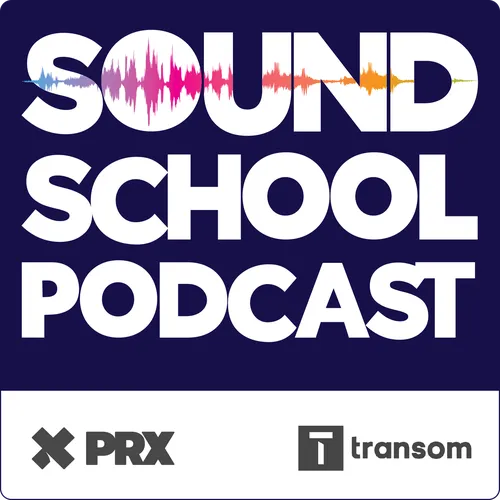
Sound School Podcast
The Backstory to Great Audio Storytelling, hosted by Rob Rosenthal, for Transom and PRX.
- Update frequency
- every 14 days
- Average duration
- 22 minutes
- Episodes
- 364
- Years Active
- 2011 - 2025

AfroQueer And Podcasting In Kenya
Selly Thiam says producing an LGBTQ podcast in Kenya is incredibly challenging. There's homophobia, government censorship, and a potential audience that still doesn't quite know what a podcast is. An…
00:25:14 |
Tue 12 May 2020

What Do You Stand For?
Why do you report a story or produce a podcast and send it out into the world? What gives you purpose? What do you stand for? Rob finds meaning from the original NPR mission statement. He talks to Bi…
00:22:52 |
Tue 28 Apr 2020

Gathering Scene Tape While Reporting From A Closet
Because of COVID 19, Reporters are scrambling to figure out how to report from home given social distancing guidelines and shelter in place orders. In response, reporters are devising clever ways to …
00:17:45 |
Tue 14 Apr 2020

Take A Walk With Your Mic
This historic moment may be a good time to reconnect to the sonic environment. The latest episode of HowSound provides inspiration to do just that.
00:31:32 |
Tue 31 Mar 2020

Poetry As Narration
Narration in stories is usually just that - narration. Someone in a booth reading or ad-libing a script. But, "Borders Between Us" is different. Producer, Saidu Tejan-Thomas, uses poetry to tell the …
00:28:07 |
Tue 17 Mar 2020

Two Student Stories About Music
Two stories, produced in a week by Transom Traveling Workshop students. The first, by Georgia Walker at our workshop at WPLN in Nashville. And the second, by Maribeth Romslo at our workshop in Seattl…
00:18:09 |
Tue 03 Mar 2020

Being Present With A Microphone
The first time Rob listened to "A Cow a Day" he thought "What the??!" But then he listened again and was hooked. Rob talks to Pejk Malinovsky, the producer of the doc, about his two wildly different …
00:22:55 |
Tue 18 Feb 2020

Got Your Ears On?
Got your ears on? You'll want them as Rob threads his way through a wide variety of clips that caught his attention over the last few months. A man injects Fentenyl into his neck... Toni Morrison sp…
00:23:09 |
Tue 04 Feb 2020

Shereen Goes Quiet
Shereen Marisol Meraji of Code Switch told me she's sick of her voice -- the authoritative narrator. In response, Shereen recently experimented getting out of the way and letting the tape do the talk…
00:24:23 |
Tue 21 Jan 2020

When The Story Is About You But Not About You
Let's face it: Use of the pronoun "I" has gotten out of hand. There's much too much navel gazing and self-indulgence in so many podcasts. And yet, sometimes using the first person as a reporter is th…
00:20:25 |
Tue 07 Jan 2020

Pigeons and Octopuses – Two Transom Story Workshop Stories
Two treats for your ears. Stories produced by graduates of the Transom Story Workshop -- Ruby Schwartz and Cariad Harmon. They're well worth a listen if for no other reason than their stories are abo…
00:24:38 |
Tue 24 Dec 2019

Reporting On The Reverse Freedom Riders
The backstory to WGBH's Gabrielle Emanuel's reporting on a hidden past is fascinating. How she found people connected to the Reverse Freedom Riders… How she communicated with them by hand-written not…
00:16:30 |
Tue 10 Dec 2019

Staying The Course In A Tough Interview
When you're yelled at. Called a prostitute. Told you're a liar and shameless and malicious... How do you stay the course and keep interviewing? Brazilian journalist Leticia Duarte explains her approa…
00:24:31 |
Tue 26 Nov 2019

Navigating Mongolia With Fixers
Emily Kwong had never been to Mongolia. She doesn't speak the language. She didn't know her way around. It was winter and very cold. She was in-country alone -- no fellow producer. The only way she w…
00:16:40 |
Tue 12 Nov 2019

Scoring Stories: Part 2
Rob talks specifically about how to bring music in and out of a story. And, then, he takes a stab at the impossible: explaining one aspect of how to select music to use for scoring.
00:17:44 |
Tue 29 Oct 2019

Scoring Stories: Part 1
How do you score a story with music is one of the most frequent questions, HowSound's Rob Rosenthal is asked. Up now, the first of two episodes on the fundamentals of using music in stories.
00:23:39 |
Tue 15 Oct 2019

Interviewing For Emotions
HowSound listeners always seem to want tips on interviewing. Liz Mak of Snap Judgement delivers on this episode with her approach to interviewing for emotions.
00:21:24 |
Tue 01 Oct 2019

Jaw-Dropping Clips
Get your ears on for this episode. Rob presents clips from podcasts that made his jaw drop including Love + Radio, The Ballad of Billy Balls, and Have You Heard George's Podcast.
00:24:43 |
Tue 17 Sep 2019

Anything Can Happen. That's The Best Part.
Reporting in the field can be chaos. Anything can happen. NPR host Noel King says that's the best part of being a journalist -- chasing a story that's ever-shifting.
00:20:09 |
Tue 03 Sep 2019

Bellwether's Speculative Journalism
In 2017, producer Sam Greenspan took a leap. He left his producing job at 99% Invisible for... well, he wasn't exactly sure at the time. Now, two years later, Sam's launched Bellwether, a podcast emp…
00:17:45 |
Wed 21 Aug 2019
Disclaimer: The podcast and artwork embedded on this page are the property of Rob Rosenthal/PRX/Transom.org ([email protected]). This content is not affiliated with or endorsed by eachpod.com.